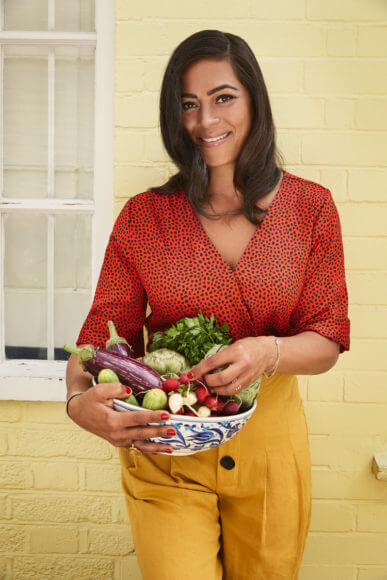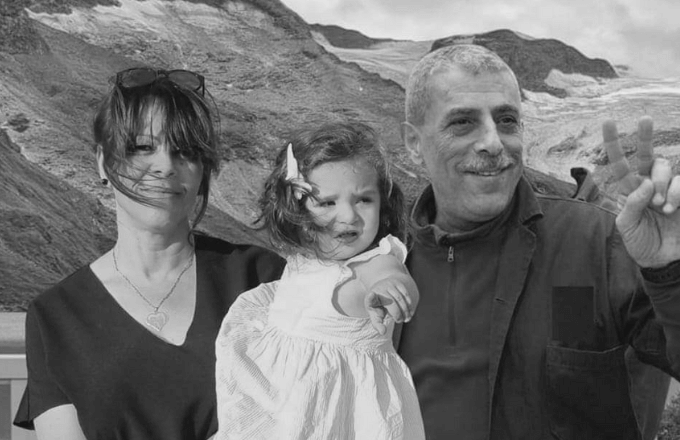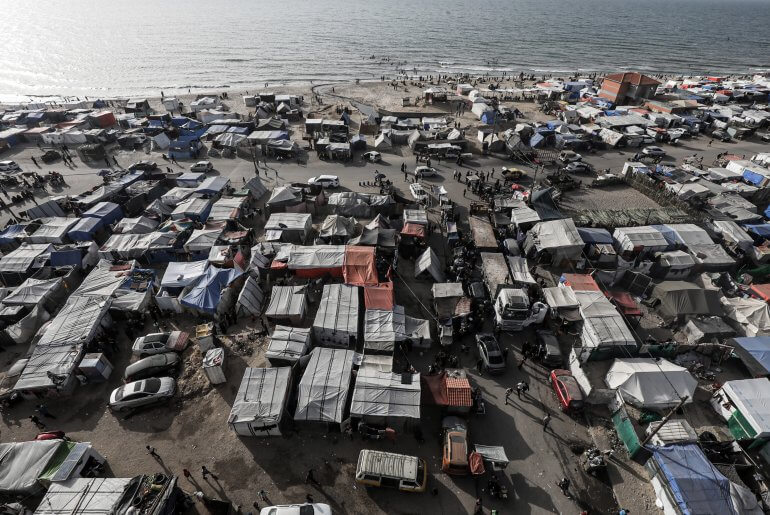PALESTINE ON A PLATE
Memories from my mother’s kitchen
by Joudie Kalla
pp. 240. Interlink Books. Paperback $ 25 | Hardback $ 35
BALADI
A Celebration of Food from Land and Sea
by Joudie Kalla
pp. 256. Interlink Books. $25
Interlink is offering a $20 discount for readers who purchase “Palestine on a Plate” and “Baladi” together.
Friends no longer gather for meals, no one is hosting ample tables for visitors, and strangers are not gabbing with whoever is seated close by at a bar for dinner. But there is food for sale even if the shelves at stores are half-stocked. It is clear this is a time of extraordinary abstention, yet it is also a season of culinary delights.
“People are thinking about what would mama make?” chef Joudie Kalla tells me via telephone from her home in London where she is isolating with her two dogs. She is mid-meal, sating herself with grilled halloumi cheese, Lebanese cucumber, tomato, and drizzles of olive oil dashed with salt and pepper.
When asked how has her approach to cooking has changed recent weeks she confesses, “it all depends on my mood quite honestly. If I’m feeling quite low then sometimes I make really quick meals,” or “quick fixes” as she later calls them. These are simple, unfussy staples of Palestinian cuisine liked spiced lamb manouche.

“I think the most important things is just to plan ahead and make use of all of your ingredients.” On her most prolific days of quarantine cooking, she focuses on “big batches” for instances, prepping pounds of lehme, or “meat” in Arabic.
“I make six or seven portions of that and I put it in the freezer and then I make a another big batch and put it in the freezer straight away.” This method frees up time, when time is most elusive.
As far as ingredients go, Kalla passed on the mania of panic buying that engulfed the UK. She’s a longtime bulk shopper and already had her own reserves. Her lentils don’t come in small bags the size of a sandwich. “I buy a five-kilo pack, I’ve been like this all my life.”
“I was looking at my kitchen thinking thank God my mom raised me up this way. It’s good to have extras just in case for emergency cooking,” she said.
When she does her weekly run to pick up essentials, she buys from small businesses, “I tend to support my local suppliers and they usually have everything. If you go to your cornerstone around your house you’ll find eggs, and flour and toilet paper.”
Kalla is the author of two cookbooks “Baladi” and “Palestine on a Plate.” She is among a generation of Palestinian chefs who have translated family recipes and made them available to tables across the world. What is perhaps unique about her approach to cooking is that her curation of family recipes cast one of the wider nets in the vast world of Palestinian cuisine.
Palestinian cooking styles are as varied as the accents in which people speak. “Each city, each town had a specific way of cooking something and each claimed to be the original,” she told me. In the north, where Kalla’s father hails from, there is more meat in the diet, while her mother is from the seaside towns of Yaffa and al-Lydd where fish are regular features of the local palate. “Mom’s side of the family cooked very, very spicy hot lemony dishes with lots of vegetables,” while “my dad’s family is from the north where they have meat, lamb, bulgur, lots of yogurt dishes.”
Her books reflect booth of these traditions and also the fusion of the two. Kalla was born in Syria to parents who were from refugee families expelled from Israel during the 1948 Arab-Israeli war. She was raised in both Qatar and London. Food has always been a cornerstone of her identity.
Her maternal and paternal grandmothers met while walking to Syria and later lived in the same building. Her mother and father grew up together. After they married, her mother made it her mission to learn the culinary classics of her father’s family.
“Its such a tiny sesame size piece of land you have so many different ways to make the same thing, which I love,” Kalla said.
Kalla has shared with us her recipe for kufta bil tahineh, otherwise known as ground lamb kufta with tangy tahini sauce. It the kind of dish that easy to scale up or down. What’s more, it is the epitome of comfort food: meat and potatoes smothered in a silky warm sauce. The below excerpt comes from her first book “Palestine on a Plate.”
I’ve made this dish for dinner parties with 20 people (and it was a hit), and for dinners alone where I wanted to indulge. It wasn’t until I read Kalla’s recipe that I was able to correct my technique and get the sauce to the perfect consistency. The tip I learned — pre-cook the meat before adding the nutty and zesty tahini. If it goes in at the same time, it will turn runny.
“Sometimes a tiny instruction can change the whole end result of a dish,” Kalla told me.
Excerpt from “Palestine on a Plate”
- 1lb 5 oz (900 g) ground lamb
- 1 onion, chopped
- a bunch of fresh flat-leaf parsley, chopped
- 2–3 teaspoons sea salt black pepper
- ½ cup (120 ml) tahini
- 3 tablespoons Greek yogurt
- juice of 4 lemons
- green peppers, chili, radishes, lemon slices, and Khubez (Pita Bread) to serve
Serves 4–6
The flavor of the sharp tahini sauce with the beautiful spiced lamb in this dish is such a wonderful contrast in your mouth—it’s like an ivory velvet snow covering rough mountains of goodness. I love tahini. It goes so well with meat and fish and is also great in salad dressings. It adds another dimension to this recipe and the sharpness of the lemon juice makes the whole thing divine. This recipe is so simple that you really can’t go wrong, and the end result actually looks like you have put a lot of effort into making something that tastes so great. That’s the wonder of cooking—there are so many ingredients that marry well, that you can just keep making new things all the time with similar ingredients in different combinations. This dish will have you dreaming of the next time you will make it. Or hoping that no one else will want the last slice…
Preheat the oven to 425°F (220°C).
Mix the ground lamb with the onion and parsley, and add about 2 teaspoons of the salt, and a little pepper. Tip it into an ovenproof pan or dish and gently pat the mixture down, making indents every ¾ inch (2 cm) to create little dips in the surface. Do not press the meat down too tightly, though—you don’t want a dense texture.
Mix the tahini and yogurt together and add the lemon juice. It will begin to seize and thicken but don’t worry, it will loosen up. Add ½ cup (120 ml) water and taste for flavor, adding a little salt if needed. You want it to be zingy and a little runny. Set aside. Bake the meat for about 15 minutes, until browned, then take the pan out of the oven. Pour the tahini mixture all over the surface. Return the pan to the oven for another 10–15 minutes, or until slightly charred on top. Serve with green peppers, chili, radishes, and some Khubez (Pita Bread).
Tip: Transform the above dish into Kufta Bil Batata Wa Banadora—a very similar dish using vegetables as a topping. My mom would make these side by side so we could have both, since some of us liked one more than the other. Prepare the meat, onion, and parsley and press into an ovenproof pan or dish as above. Layer 2 peeled and thinly sliced large potatoes and 4–6 thinly sliced large tomatoes on top of the kufta, overlapping as you go, and keep going until you have covered the surface completely. Bake for about 30 minutes, checking it every now and then to make sure the potatoes are cooking. Serve as above.




Thank you for the recipe–it looks and sounds delicious! It will make a great dish to put on the cover of a new book about the “New Israeli Cuisine,” all about how Zionists brought kufta bil tahineh and hummus, etc., to a middle east that didn’t exist until the European colonizers came! Now the Zionists should build factories in the West Bank and sell and market mass-produced versions to Europe and America marked “Made In Israel”! If the Zionists can steal some farmland for the factories and then make the farmers work in the factories in order to survive, so much the better!
Now I’m hungry.